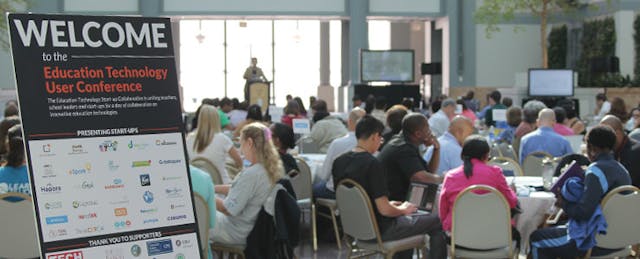This is what edtech should be: teachers, administrators, and even students, and edupreneurs participating in the same conversation.
On Thursday, July 11, hundreds of teachers and administrators from public, private and charter schools from the Chicago region spent a day of their free time learning more about the 30 edtech startups and trying out their products. The beautiful, light-filled Harold Washington Library, imbued with a long history of spreading knowledge for all, provided the perfect backdrop for these lively interactions.
The brainchild of Eileen Murphy, former teacher, curriculum developer, and district-level administrator for Chicago Public Schools and now founder and CEO of ThinkCERCA, the Education Technology Startup Collaborative User Conference facilitated many informal interactions among tech-savvy educators and startup teams building the tools.
Samuel Dyson, Director of Hive Chicago Learning Network, masterfully kicked off the event with a rally call: “learning as a lifestyle,” which many teachers took to heart as they volunteered a summer vacation day to learning from and helping entrepreneurs.
Chris Liang-Vergara, Chicago native and Director of Instructional Technology for Personalized Learning at FirstLine Schools, opened his keynote with a quote from John Dewey, squarely reminding participants that the focus is on education and not the technology. In both his opening and comments during the closing panel, Liang-Vergara emphasized that educators should first identify what they hope to achieve or the problem they want to solve, then determine the best tools to use--and not the other way around. “If the technology fits, make it fit. But don’t force it to if it doesn’t.” Liang-Vergara also asserted that the feedback loop between education technology and the educators using them is fundamental to the future of education.
The takeaway message of the day: educators recognizing that they have a crucial voice in the development of technology tools that meet their needs. With so many of the edtech startup teams founded by former educators, it became even more apparent that teachers have the ability to identify their needs and participate in finding and creating solutions. Not all teachers can or should become edupreneurs, but all can play a critical role in the conversations about how to develop and implement the best tools to support student learning.
The morning and afternoon format mixed 3-minute company demos with hour-long open sessions for educators to spend time with individual startups of their choice. Startups also solicited feedback during these informal sessions. Many teams took advantage of the opportunity to identify educators who were interested in continuing conversations later. One grammar-focused startup, NoRedInk, shared a link to a poll which allows educators to vote directly for the next features and topics they’d like added. (Want to add your vote? Click here!)
Teach Plus, a national non-profit dedicated to improving outcomes for urban students, also polled participants on a range of topics related to educational policy, preparedness for online assessments, and important issues in education. Projected instantly on large screens spread throughout the space, participants were able to see the room responses in real time. (Look next week for EdSurge’s recap of the poll results!)
The lunch panel’s star was a 13-year-old from Chicago Quest who offered a much-needed student's perspective on all the technology being built. He shared that it was better to “be a protagonist than a student,” he said, illustrating his point that he preferred building technology than simply consuming or learning how to use it. (Many of the edtech startups wanted to hire him on the spot!) Fellow panelist, Neal Sales-Griffin, CEO of The Starter League (formerly called Code Academy) echoed this when he shared that “growing up, I did not know that I didn’t have to just use computers. I did not know then that I could BUILD computers.”
As Liang-Vergara reiterated, we are “entering an era where digital tools can enable teachers to guide children through curricula and experiences unlike ever before.” He used an analogy of maps to illustrate his point about the important role of teachers. Map directions are suggestions, he said, but only an educator knows best on how to guide students through a journey of self-exploration.
Discussions are already underway for similar events to be held in the SF Bay Area and in Baltimore. This user conference may be signaling a shift in edtech conferences altogether.


